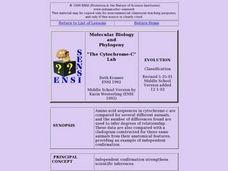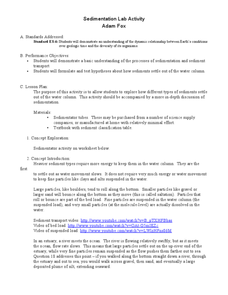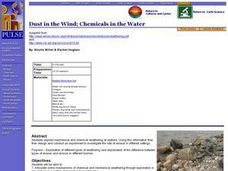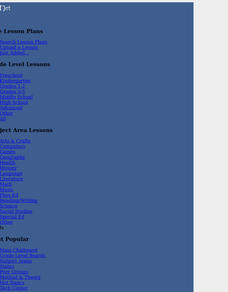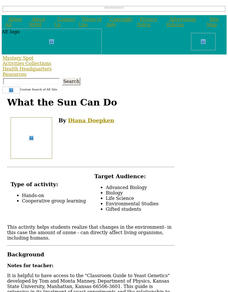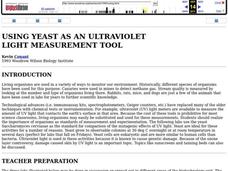Curated OER
Semipermeable Membranes and Bioaccumulation
Beginning biologists place a drop of food coloring into water of differing temperatures to observe the effect on the diffusion rate. They remove the shells from raw eggs and then experiment with osmosis over the remaining membranes....
Curated OER
The Cytochrome-C Lab
Students examine a method biologists use to try to determine relationships. They examine how amino acid sequences have been determined for a number of proteins, and how scientists can make inferences about DNA based on the amino acid...
Curated OER
Sedimentation Lab Activity
Students predict how sediments in a water column will settle. In this earth science lesson, students examine the layers of sedimentation. Students are given sediments to place into a column of water and observe how they settle....
Curated OER
How Do I Get a Pure Sample of the Molecules I Make?
Learners initially engage in online research and consult print materials to identify a compound to produce. Once a selection has been made, individually, students conduct lab experiments to isolate substances. The end product is a...
Curated OER
Constructing a Phylogenetic Tree
Students are given the opportunity to analyze DNA sequence differences between organisms in order to establish a reasonable picture of the evolutionary relationships between them (Phylogenetic Tree). In the simulation form they are...
Curated OER
Denaturing Proteins
Students investigate how to denature proteins. For this denaturing protein lesson plan, students explore the different ways to denature proteins in the lab. They use heat, acids and bases, organic compounds and heavy metals to denature...
Curated OER
Survival Still
Lead your class to construct a solar still on campus to demonstrate how water can be extracted from the soil. The power of solar energy is emphasized, as is the concept of how capillary water can be recovered and purified by using a...
Chicago Botanic Garden
Are All Plants Created Equal?
Photosynthesis requires energy and produces food, and cellular respiration produces energy and requires food. An interesting lesson analyzes the factors that affect the rates of photosynthesis and respiration. Classes spend one day...
Curated OER
Which Wrap Is Wrapped Right?
Students investigate the integrity and strength of different types of food wraps. They test the wraps and create a graphic organizer for the data. Once it is organized then a lab report can be written. The lesson contains background...
Curated OER
Using Abiotic and Biotic Parameters to Monitor Air Quality
Students identify the abiotic factors that influence a river or stream and the organisms that live in it. They measure several abiotic and biotic parameters to gauge water quality. Students examine the biotic environment by identifying...
Curated OER
Animals of the Fire Ice
Students examine ocean life by identifying methane hydrates. In this ocean life lesson, students research organisms that live in the coldest, deepest parts of the ocean and live off methane hydrates. Students create a group...
Curated OER
Dust in the Wind; Chemicals in the Water
Students explore mechanical and chemical weathering at stations. They articulate some mechanisms of chemical and mechanical weathering through exploration in a lab. Students stations describe how chemical weathering differs from...
Curated OER
Surface to Volume Ratios
Students measure the rate of diffusion and to calculate the surface area to volume ratios of varying cell sizes. The lesson is very clearly organized with a useful student worksheet provided. They perform a lab experiment which is...
Cornell University
Glued into Science—Classifying Polymers
Explore the unique characteristics of polymers. A complete lesson plan begins with a presentation introducing polymers. Following the presentation, young scientists develop a laboratory plan for creating substances using polymers....
National Nanotechnology Infrastructure Network
Synthesis and Characterization of CdSe Quantum Dots
Does the size of a sample change the physical properties of that substance? It turns out it can! Young scientists combine physics and chemistry to synthesize CdSe quantum dots and record their color properties. Learners should...
Curated OER
What the Sun Can Do
Young scholars develop and test a unique, personally-relevant hypothesis about the consequences of exposure to UV radiation based units on a living organism, common baker's yeast (Saccharomyces cerevisiae).
Curated OER
What Does That DNA Molecule Really Look Like???
Students extract DNA from animal liver cells. They separate, collect and describe the appearance from the extracted DNA while role playing as an intern in a city's forensics.
Curated OER
USING YEAST AS AN ULTRAVIOLET LIGHT MEASUREMENT TOOL
Pupils realize the importance of organisms as standards of measurement and experimentation.The first lab is a simple survival curve that demonstrates the effects of UV light on cells. The second lab looks at repair mechanisms of the DNA...
Curated OER
Cracking the Code - Cloning Paper Plasmid
Students explore the "genetic code." They observe how genes may be manipulated for genetic research, gene cloning, and genetic engineering. In a lab setting, students examine the mechanics involved in cutting and ligating DNAs into a...
Curated OER
Thermoset Polymers
Young scholars complete a lab activity with polymers to allow them to better understand how to make "observations". In this science lesson students make measurements and collect data.
Curated OER
Proteins Expressed At Different Stages
Students investigate protein electrophoresis in a lab setting. Full laboratory equipment is needed and safety should be taught. The level of prior knowledge needed to perform lab is high and is ideal for an honors class.
Curated OER
Using Yeast as an Ultraviolet Light Measurement Tool
Students accurately measure the relationship between radiation dose and either survival or some genetic event such as mutation or recombination. They investigate the damage that was done to the DNA molecule as a result of exposure to...
Curated OER
DNA Blueprint for Life
Students isolate DNA from different food sources. For this biology lesson, students research DNA extraction. They analyze DNA stands collected from the lab, and compare the differences between each.
Curated OER
Losing An Island
Students examine carbon dioxide and determine the impact of greenhouse gases on the earths spheres. In this pollution lesson students complete a lab activity to see the impact of gases on the environment,

